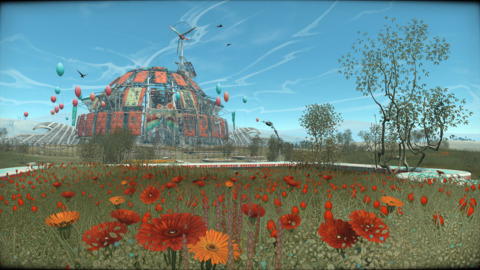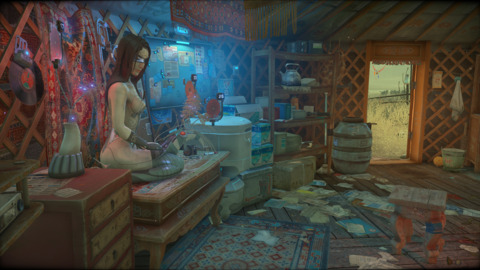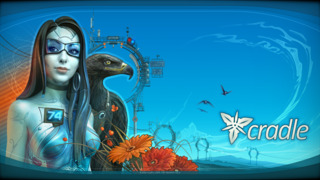Neo-Buddhism

Cradle is a game that starts out as a sci-fi mystery and turns into a Buddhist tale. You begin in a Mongolian yurt a half-mile from an abandoned amusement park and miles away from anything else. You have amnesia, so you start by learning about the world from the clippings scattered around the yurt. An inactive robotic "vase" is your only companion at first, so you eventually reactivate her. Then you begin learning about the people around you: the former human now inhabiting the vase, your friends, your parents, your grandfather.
As you learn more, you realize certain gaps in your knowledge are also unknown by everyone else. Transferring a consciousness to a robot is easy enough to grasp, but then the game starts delving into other phenomena: Emotions as a universal force, measurable yet barely understood, producing new elements (discovered after the first robotic transfers) that can save or doom the world. Society separated into "beautifuls" and "uglies" based on a measurable scale of whether they produce good or bad emotions. Explosions of this new element that cause "irradiated" zones which twist the laws of physics. It's not soft sci-fi, it's surreal sci-fi, an attempt by civilization to break down and analyze something that is essentially magic.
But it's not "magic" in the Mass Effect sense, but something more subtle. Themes of rebirth and cycles begin to poke through the narrative, and suddenly the Buddhist shrine off to the side isn't just a piece of local flavor, but a vital plot point. A Neo-Buddhist tale (featuring Buddha listening to a radio) provides the last clue for the protagonist to learn about his parents and himself. Providence and faith are unironically mentioned. The last act is about death, rebirth, and acting partially on knowledge and partially on faith. It doesn't make technical sense, I suppose- the exact mechanics involved are only alluded to, barely explained- but it makes thematic sense. It requires some digging to figure out, and even then you might not like it- the argument over the ending is 100+ posts on the Steam forum trying to understand it and subsequently calling it great or stupid- but the ending and its world have ingrained themselves into my mind. I finished it in just 4 hours, but I'll remember it longer than games I sunk dozens of hours into.

Part of that is from how unusual the environment is. Rural Mongolia is not a typical sci-fi setting. A futuristic robot lays on your grandfather's worn table. You have a large-screen TV, but need to hang clothes out to dry. Colorful rugs are littered with newspaper clippings discussing the slow collapse of humanity. It's a dystopian story set as far from the dystopia as you can get, and the dissonance between the beauty & the lonely despair is startling. The closest comparison I can think of is the aesthetic of The Talos Principle.
Don't expect any mind-bending puzzles like The Talos Principle, though. The gameplay here consists of speaking with 2 characters, object hunts, and 4 arcade platforming sequences. It's a small diversion at best and irritating at worst, but the plot and the world-building carried me through it easily. However, for some people this lack of meaningful gameplay may be a dealbreaker.
Not for me, though. It's been 3 days since I finished it and I'm still thinking about it. I'll probably remember it for years. If you're looking for a strange, unique sci-fi story in a game, this is one of the most unique ones I've seen.
